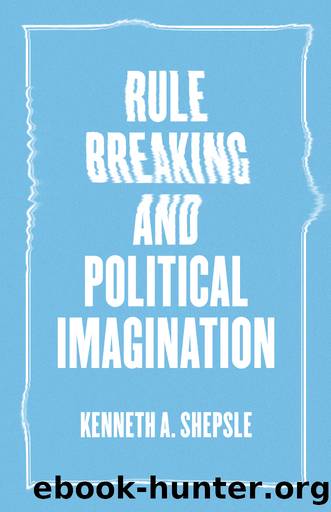Rule Breaking and Political Imagination by Kenneth A. Shepsle

Author:Kenneth A. Shepsle [Shepsle, Kenneth A.]
Language: eng
Format: epub
Tags: American Government, Political Science, General, History & Theory
ISBN: 9780226473352
Google: rLQvDwAAQBAJ
Goodreads: 34227449
Publisher: University of Chicago Press
Published: 2017-09-01T00:00:00+00:00
· 9 ·
Stealing Elections
Elections are the jewels in the democratic crown. Not only are they the mechanisms by which winners and losers are determined, but they also provide the means by which we hold incumbent officers accountable for their actions while in office. The first aspect, known as selection, in principle allows electorates to sort out good candidates from bad (however defined). The second aspect offers a potential solution to the problem of moral hazard, deterring bad behavior in office and encouraging good behavior by the after-the-fact determination of a politicianâs electoral fate. Just as an employee of a firm is selected in the first instance in a competitive labor market, and his or her performance is subsequently judged at contract-renewal time, politiciansââemployeesâ of constituenciesâface selection and evaluation hurdles through the electoral process.
The electoral means by which constituency-principals control their politician-agentsâselection and evaluationâcan be short-circuited in a variety of ways. In American elections, for example, campaign finance is a big concern. Large donations to the campaigns of politicians elevate the influence of large contributors on these very same politicians. Campaign finance affects selection, enhancing the electoral prospects of a politician sympathetic to the interests of the donor. At the same time, in reelection campaigns, cash from wealthy donors serves to insulate the incumbent politician from evaluative damage arising from his or her service of donor rather than constituency interests.
Although short-circuiting elections through the distorting effects of campaign contributions is primarily a concern in American-style elections, short-circuiting is not an exclusively American problem. Closed-list elections in parliamentary systems constitute another example. In these elections each constituency commonly elects several representatives. But voters donât select candidates directly. Parties do. Each party constructs a rank-order list of politicians, while voters cast votes for the party not for individual candidates. The total vote in a district for a party governs how many of the partyâs candidates are elected from that district, but it is the party list that determines which of its candidates succeed. Once a partyâs quota of elected legislators is determined by its share of the total vote, successful candidates are drawn in order starting at the top of the partyâs list until the partyâs quota is reached. A politicianâs position on the list is key. No matter how poor the quality of a candidate may be or how badly behaved she had been during her term in office, if she is high enough on the party list, her poor quality or bad performance will be insulated from voter evaluation and punishment. Voters, of course, may punish parties for the poor quality or behavior of their candidates, but they cannot target this punishment on precisely the politicians who deserve their wrath, especially if those politicians have managed a high placement on the party list.
Electoral arrangements, whether American-style or parliamentary, are imperfect instruments of constituency control. They are what they are and warts and all, comprise rules that provide at least some minimal amount of voter influence and control. But what happens when
Download
This site does not store any files on its server. We only index and link to content provided by other sites. Please contact the content providers to delete copyright contents if any and email us, we'll remove relevant links or contents immediately.
Collaborating with Parents for Early School Success : The Achieving-Behaving-Caring Program by Stephanie H. McConaughy; Pam Kay; Julie A. Welkowitz; Kim Hewitt; Martha D. Fitzgerald(897)
Entrepreneurship Education and Training: The Issue of Effectiveness by Colette Henry Frances Hill Claire Leitch(665)
Adding Value to Policy Analysis and Advice by Claudia Scott; Karen Baehler(499)
Materializing the Middle Passage by Jane Webster;(496)
Race and American Political Development by unknow(488)
Sociological Perspectives of Health and Illness by Constantinos N. Phellas(478)
American Government and Politics Today by Steffen W. Schmidt Mack C. Shelley Barbara A. Bardes(475)
Human and Global Security : An Exploration of Terms by Peter Stoett(461)
Control Of Oil - Hardback by Kayal(459)
The Disappearance of Rituals: A Topology of the Present by Byung-Chul Han(399)
Advances in Child Development and Behavior, Volume 37 by Patricia J. Bauer(396)
The Catholic Church and European State Formation, AD 1000-1500 by Jørgen Møller(388)
The World According to China by Elizabeth C. Economy(379)
Theories of Counseling and Psychotherapy: A Case Approach by Nancy L. Murdock(370)
Left Is Not Woke by Susan Neiman(367)
Application of classical statistics, logratio transformation and multifractal approaches to delineate geochemical anomalies in the Zarshuran gold district, NW Iran by unknow(362)
Turkey's Relations with the West and the Turkic Republics: The Rise and Fall of the Turkish Model by Idris Bal(353)
Cross-Cultural Child Development for Social Workers by Lena Robinson(348)
Japan's Ainu Minority in Tokyo by Mark K. Watson(331)
